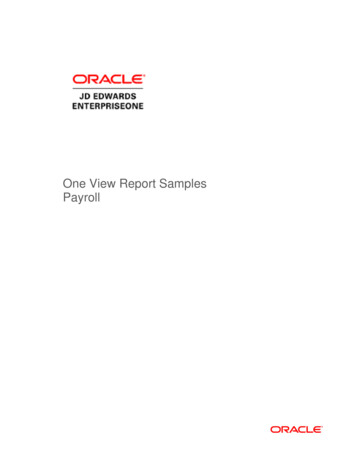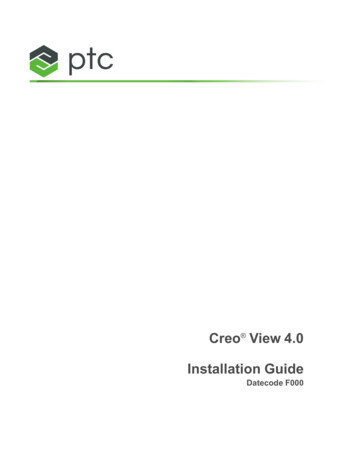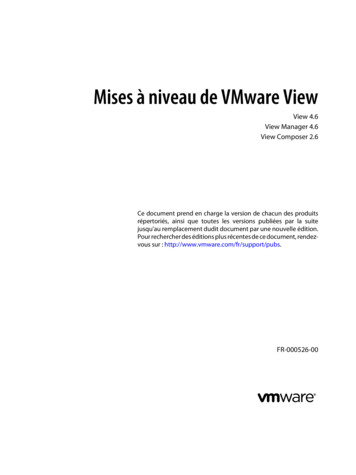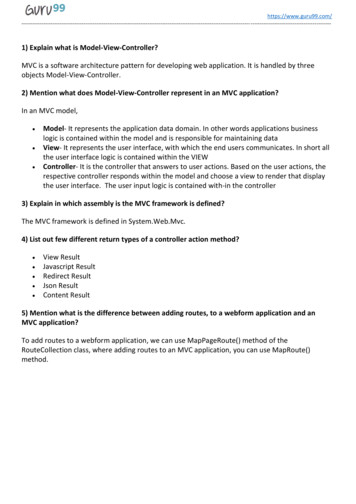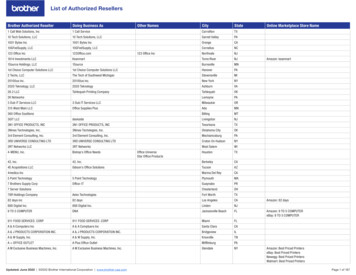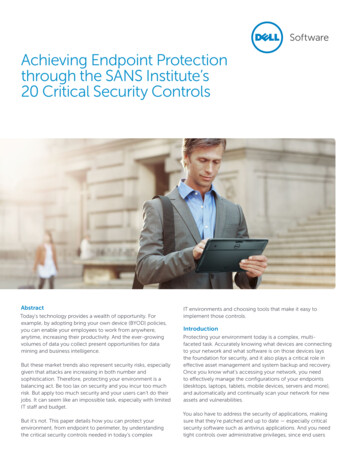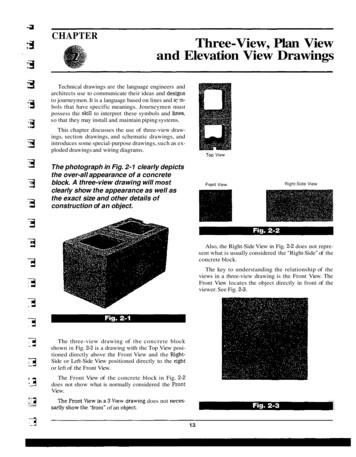
Transcription
International Journal of Finance and Managerial Accounting, Vol.3, No.9, Spring 2018A Critical View of Global ManagementAccounting PrinciplesMona AbednazariPhD candidate, Department of Accounting, Faculty of Management and Economics, science and research Branch,Islamic Azad University, Tehran, Iranmona.abednazari@yahoo.comFraydoon Rahnamay RoodposhtiFull professor of Accounting, Department of Accounting, Faculty of Management and Economics, science and research Branch,Islamic Azad University, Tehran, Iran. (Corresponding author)rahnama.roodposhti@gmail.comHashem NikoomaramFull professor of Accounting, Department of Accounting, Faculty of Management and Economics, science and research Branch,Islamic Azad University, Tehran, Iranh-nikoumaram@srbiau.ac.irZahra PourzamaniAssociate Professor, Department of Accounting, Central Tehran Branch, Islamic Azad University, Tehran, Iran.zahra.poorzamani@yahoo.comABSTRACTThe aim of this study was to investigate accounting principles of integrated management using a criticalapproach. To this end, in this study, we used four principles of relevance, influence, value, and trust as the globalmanagement accounting principles. The research questions and hypotheses were developed based on the criticalthinking that management accounting is not currently convincing both in theory and practice. This study isconsidered a survey research as it used questionnaires to collect experimental data for testing the researchhypotheses. The results of statistical tests performed in this study indicated that the respondents had positiveattitudes toward the four afore-mentioned principles and this they can be considered as global managementaccounting principles.Keywords:global principles, management accounting, relevance, influence, value, trust.With Cooperation of Islamic Azad University – UAE Branch17
18 / A Critical View of Global Management Accounting Principles1. Introduction2. Literature ReviewToday, the combination of economic andnoneconomic data is taken into account more seriouslythan before and thus management accountants areworried about their position in organizations (Saghafi& Barzgar, 2012). Currently, management accountingshould be looking for what is happening in theeconomy and take into account what needs to beunderstood and implemented in practice by having aclose awareness of the environment and preventingideological and methodological gaps (Kristanto, 2010).Accordingly, this study addresses one of theunderlying causes of problems and challenges facingthe development of accounting management that is thelack of integrity in management accounting principles.Since management accounting is based on a paradigmand follows varies theories, it needs to comply with aset of global principles, as the lack of such principlesand unawareness of their influential or detrimentalfactors does not allow an organization to turn into atranscendental organization and thus losing its way incorporate governance system (Vakilifard et al., 2014).Therefore, global management accounting principlesare essentially important for the success oforganizations as they provide an approach toorganizational management that con contribute todeveloping and implementing organizational strategies(Chartered Global Management Accountant, 2015).On the other hand, this study can be significant asbecause of its critical approach to global managementaccounting principles. In this approach, globalmanagement accounting principles are consideredfrom a wider perspective and the principles that areprovided are based on the recognition of social causesand interactions among the employed techniques,social drives, and the fact that the current position ofmanagement accounting is not satisfactory. That’s whythe inferred principles would be closer to reality(Rezapour, 2014). In fact, relying on a critical realisticapproach to human experiences can contribute toimproving other paradigms and providing a betterunderstanding of the meaning and implications ofsocial phenomenon and experimental studies (Modell,2007). The next section addresses the theoreticalbackground of the study and the development andtesting the research hypotheses are discussed in othersections.So far, four paradigms governing the history ofmanagement accounting have been recognized: theIndustrial Revolution, Direct Costing, Activity-BasedCosting, and ultimately Paradigm-Based Standards. Infact, each paradigm includes a couple of theories andschools of thought and to understanding theirprinciples and insights; we can use the dominantparadigms in sociology such as positivism,hermeneutics, and the critical paradigm. The criticalparadigm provides an alternative for the meaning ofmethodology. Unlike positivism and hermeneutics, itdoes not have an independent theory but it totallycriticizes these two approaches. According thisparadigm, good evidence is the one that is derivedfrom theories that take away alienation from humanbeings. Therefore, the critical paradigm provides amore extensive perspective than positivism andhermeneutics (Rahnamai Roudposhti, 2016). The useof critical theory has led to the emergence of criticalaccounting (Degan, 2005). The main assumption ofcritical accounting is that the society can becomedifferent from what it is now, and that the humanconscious behavior and action are able to change orimprove the social world if they follow critical theories(Shabahang, 2012). Therefore, critical accounting is abroad concept that encompasses a wide range ofaccounting approaches but it focus more oncontradictions than agreements (Goudarzi, 2009).The concept of critical accounting can be soughtmore precisely in critical management accountingwhich is a governance system that acts at macronational and international and micro organizationallevels and accounting parameters. These factorsaccount for economic, political, and ideologicalaspects (Jones and Dugdale, 2001). Criticalmanagement accounting is in fact an attempt tounderstand accounting management practices andextend them into the macro sociopolitical level. In thisapproach, the impact of the society and institutionsalong with conflicts and contrasts in social relations onmanagement accounting is discussed. In criticalmanagement accounting, it is expected that the changein management accounting approaches is made basedon social, political, and economic relations in eachsociety, the knowledge power chart, and anunderstanding of systems (Goudarzi, 2009).Therefore, the theoretical foundations ofdevelopment and assessment of global managementVol.3 / No.9 / Spring 2018
International Journal of Finance and Managerial Accounting / 19accounting principles rely on the fact that managementaccounting assist organizations in making effectivedecisions through extracting valuable information.Decision-making based on evidence or soundjudgments rather than guessing and speculation makessuccess more achievable. All global managementaccounting principles originate from this ideal. Globalmanagement accounting principles describe basicvalues, qualities, practices, rules, and characteristicsintended by accounting practitioners. These principlesprovide the organization with an approach todeveloping and implementing strategies. Althoughmanagement accounting is applied differently fromone organization to another, Chartered GlobalManagement Accountant and American AccountingAssociation have developed as set of principles to helporganizations create an effective management and theyare assessing these principles. The assessment ofskills, competencies, performance management, andactivities of management accountants are related tothese principles and they suggest how the currentmanagement accounting function meets theorganization’s needs. Influence, relevance, value, andtrust are considered as four global managementaccounting principles (Chartered Global ManagementAccountant, 2015).The principle of influence aims to facilitatemaking more effective decisions about theorganization’s strategy and implementing it at alllevels. This principle assumes that communicationscan create an effective insight and that managementaccounting affects information-based decision-making.The principle of relevance supposes that managementaccounting helps the organization in planning andproviding information sources needed for the creationand implementation of strategies. In fact, the primaryfunction of management accounting is to makeinformation available for decision makers on atemporal basis. Accordingly, management accountingshould provide the best and the most accessibleinformation resources that are consistent with requireddecisions, decision makers, and the decision makingtechnique. As a result, management accounting canimmediately provide insights from the currentinformation to monitor the implementation of plansand strategies by considering that these informationresources are in line with organizational goals. Theprinciple of value means that the influence on value isassessed through analyzing scenarios and models andits aim is to simulate and implement differentscenarios in order to show causal relations betweeninputs and outputs. In fact, the focus of this principle ison the relationship between management accountingand the commercial model. To this end, thismanagement accounting principle uses the relevantinformation to develop, assess, and prioritize scenariomodes and turn them into views through analyzingtheir effect on outputs from implementing scenarios.The principle of trust means that communication andsupervision create trust and it aims the management ofrelations and resources resulting from financial andnonfinancial data contribute to maintaining theorganization’s reputation and validity. Contrary to thethree previous principles that are associated with theacademic discipline of management accounting, thisprinciple focuses on personal (individual) behaviors ofmanagement accounting practitioners. To do so, thisprinciple assumes that an effective managementaccounting system consists of competent individualsuse the relevant principles through their actions tomaintain and improve the organization’s countants should be reliable in terms of morality,accountability, and their respect for the organization’svalue, government needs, and social responsibilities(Chartered Global Management Accountant, 2015).Since 2004, Chartered Global ManagementAccountant and American Accounting Association(2015) hold a symposium to discuss globalmanagement accounting principles and review thearticles published in the regard. This association hasrecently developed a set of principles to helporganizations create an effective managementaccounting, and they have adopted four principles ofrelevance, influence, value, and trust as globalmanagement accounting principles.3. MethodologyThe method used in this study is a survey methodwith an experimental design approach, as the neededdata were collected through field methods includingquestionnaires in the form of one-dimensional casestudy. The research population includes facultymembers, management accounting professors,managers and members of the board of directors ofcommercial firms and accountants working in businessorganizations. However, due to the unlimited nature ofthe research population, the sample size wasVol.3 / No.9 / Spring 2018
20 / A Critical View of Global Management Accounting Principlesdetermined as 215 persons using the Cochran formula.For the sake of the reliability of the study androbustness of the statistical results, 300 persons wereincluded in the research sample.On the other hand, for each research hypothesis,six items were developed with close responses thatwere scored using a five-point likert scale. Besides,some items addressed the respondents’ personalinformation. The reliability of the instrument wasassessed through Cronbach's alpha coefficient. If theCronbach's alpha value is more than 0.7, theinstrument has an acceptable reliability (Sirmad et al.,2006: 169). To do this, at first, 20 questionnaires weredistributed randomly among a number of respondentsin the research sample. The questionnaire contained 5general items and 6 special items were used to testeach hypothesis (24 items for 4 hypotheses).Cronbach's alpha value was calculated to be 0.80,which confirms the reliability of the questionnaireused in this study. Therefore, none of the questionnaireitems was deleted. Finally, the questionnaires itemswere modified and finalized based on the opinion ofthe experts and the suggestions made by a number ofmembers of the different groups in the researchpopulation in several stages. Therefore, it can be saidthat the questionnaire possessed the desired validity.about the general characteristics of the respondents inthis study:Descriptive statisticsOf the 300 questionnaires that were distributedamong the respondents, 241 questionnaires werecollected back and 23 questionnaires with incompleteor wrong responses were excluded from the finalsample. Therefore, only 218 questionnaires were usedfor data analysis.As it can be seen from to the information given inthis table, the respondents in sex men, with a master'sdegree, those with a financial and accountingbackground, and those with a job of over 15 yearshave the highest participation rates in this study. Thesefactors can be used to validate the research findings.Therefore, it seems that the Job background infinancial and accounting fields is almost at acceptablelimits. As a result, the respondents were qualified toanswer the questionnaire items. Descriptive statisticsfor the research questions and hypotheses are given inTable A.2The descriptive statistics for all four hypotheses inTable A.2 show that the mean scores of responses forall items is greater than the average of the range (3).The highest mean is related toitems12, 18, 22 and 31,and the lowest mean is related to items 11, 17, 25, and34. The standard deviation for each of the itemsindicates that items 16, 17, 27, and 31 have the lowestaccuracy, and items 13, 19, 24, and 34 have the highestaccuracy. On the other hand, the distribution of datashows that the least and the most frequently selectedresponses by the respondents are 1 (very low) and 4(high), respectively.4. ResultsThe statistical method used to convert the collecteddata to the required data is a one-sample student t-test.This test has been developed to compare the mean of avariable in a given population (Sarmed et al., 2008).Tables 1 and 2 present the descriptive informationTable 1: Descriptive statistics for the respondents’ demographic characteristicsItemsNumber n2183.370.76414Education2181.980.53713Field of 3 / No.9 / Spring 2018
International Journal of Finance and Managerial Accounting / 21Table 2: Descriptive statistics for research hypothesesHypothesisHypothesis 1Hypothesis 2Hypothesis 3Hypothesis 73Research HypothesesGiven the theoretical background and the literaturereview, the following hypotheses were developed inthis study:Hypothesis 1: Relevance is one of the globalmanagement accounting principles based on criticalthinking.According to the above hypothesis, relevance isconsidered as one of global management accountingprinciples. The critical origin of this hypothesis isbased on the assumption that the information preparedby management accountants for decision making in theorganization should be of relevance to theorganizational context. However, one of the mainreasons that makes managers do not use managementaccounting information is that this type of informationis not of relevance and is criticized for not beingrelevant (Bahramfar & Rasouli, 1998). In particular, ifmanagement accounting information is not relevant itwill not have certain features and thus is criticized. It1222225813324213042101320Frequently 2185811821935131413209699is expected that if global management accountingprinciples are developed, the relevance of managementaccounting information is taken as a basic principlebased on the global (and of course critical) thinkingand contributes to improving and developingmanagement accounting. In this study, the features areseen as constraints and thus management accountinginformation is seriously criticized for not having therelevant features. These features (constraints) are:inaccessibility of information (Bahramfar & Rasouli,1998), the lack of appropriate balance between past,present, and future information, between internal andexternal information, and between financial nt Accountant, 2015), not taking intoaccount all information including historicalinformation and the information about lost opportunitycosts, and the lack of correct understanding ofinformational needs of users (Mättö & Sippola, 2016),the quality, accuracy, integrity, and timeliness ofVol.3 / No.9 / Spring 2018
22 / A Critical View of Global Management Accounting Principlesinformation, and the impossibility of distortion risk(Nikoumaram et al., 2014), and the non-observance ofthree key features, i.e. relevance to time (past, present,and future), relevance to boundary (inside and outsidethe organization), and relevance to data (qualitativeand quantitative) (Chartered Global ManagementAccountant, 2015).Hypothesis 2: Influence is one of the globalmanagement accounting principles based on criticalthinking.According to the above hypothesis, influence isconsidered as one of global management accountingprinciples. The critical origin of this hypothesis isbased on the assumption that the information preparedby management accountants for decision making doesnot contain the required features to influence thedecision making process in the organization. Amongfeatures of management accounting information thatmake such information influential are the informationthat is effective in creating and maintaining theorganization’s value, the information that is based ontimely, valid, and strong evidence, the information thatprovide a global perspective about the pastperformance, the current position, and the futureprospect and planned innovations, provides usefulinformation for implementing the organization’sstrategy, creates an influential insight, and providesinformation in a suitable and timely manner for users(Chartered Global Management Accountant, 2015).Given that these features are currently of a low qualityin emanating management accounting information(Bahramfar & Rasouli, 1998), they are considered asconstraints and thus are criticized. Accordingly, it isexpected that the above mentioned features areimproved in the light of global managementaccounting principles and are organized in the form ofa principle.Hypothesis 3: Value is one of the global managementaccounting principles based on critical thinking.As stated by the third hypothesis, value isconsidered as one of global management accountingprinciples. The critical origin of this hypothesis isbased on the assumption that there is a relationshipbetween management accounting and the businessmodel, in a way that management accountinginformation implements and simulates differentscenarios by taking into account the organization’sbusiness model, tries to model opportunities and risks,and ultimately determines the effect of strategyimplementation in a quantitative manner and assessesthe possibility of producing, retaining, or destructingan output (Chartered Global Management Accountant,2015). But is this true in reality? This has made theconstructs related to the value of managementaccounting information be considered as constraintsand thus being criticized. Therefore, it is expected thatthe value of management accounting information isconsidered as a general principle. Some of theseconstructs or constraints (from the critical perspective)are as follows:The close understanding of the business model andmodeling opportunities and risks, creating values,assessing opportunities, focusing on risks, taking intoaccount costs and the potential for value creation,implementing different scenarios (Hutchinson, 2014),analyzing and valuing scenario implementation, usingmodels related to different scenarios, scenario analysis,determining the possibility of the success of anopportunity, the occurrence of a risk, and the creationor the loss of a value (Chartered Global ManagementAccountant, 2015).Hypothesis 4: Trust is one of the global managementaccounting principles based on critical thinking.As stated by the third hypothesis, trust isconsidered as one of global management accountingprinciples. The critical origin of this hypothesis isbased on the preservation of the organization’s valuethat is created through the management of relationsand resources (as the result of financial andnonfinancial data). One of the main features of havingtrust in management accounting information ity and sustainable development, integrity,and morality (Chartered Global ManagementAccountant, 2015). These features are currentlyviewed critically as factors inhibiting the validity andreliability of management accounting information. Inother words, these features are not observedadequately and this has made the quality ofmanagement accounting information are criticized interms of their reliability (Nitzl et al., 2016). Therefore,the existing constraints (the above features) have madethe constructs related to the reliability of managementaccounting information be considered as constraintsand thus being criticized. Therefore, it is expected thatVol.3 / No.9 / Spring 2018
International Journal of Finance and Managerial Accounting / 23by eliminating such obstacles or observing suchfeatures, trust is considered as a general principle.Some of these constructs are as follows:Managing relationships and building trust inresources based on financial and non-financial data,being alert to potential conflicts of interest or tions before long-term interests of theorganization or its shareholders, accountability ofmanagement accountants to their customers and othershareholders about the decisions they have taken(Chartered Global Management Accountant, 2015),matching sustainable development activities withstrategies by connecting them to business incentivesand the business model, the coordination betweenmanagement accountants' operations and the value ofthe organization (Nitzl et al., 2016), observance ofprofessional codes of ethics including honesty,trustworthiness, impartiality, professional r(Nikoumaram et al, 2014).Testing hypothesesGiven that the sample size is greater than 30persons, according to the central limit theorem, onesample t-test can be used to test the researchhypotheses. Hence, one-sample t-student test was usedto test the hypotheses. This test has been designed tocompare the mean of a variable over a population. Thehypotheses under analysis are stated as follows:{Table 3: Comparing test of average hypothesesHypothesisHypothesis 1Hypothesis 2Hypothesis 3Hypothesis 4Itemst-valueSig.Item 11Item 12Item 13Item 14Item 15Item 16MeanItem 17Item 18Item 19Item 20Item 21Item 22MeanItem 23Item 24Item 25Item 26Item 27Item 28MeanItem 29Item 30Item 31Item 32Item 33Item 572.733.792.993.544.39-Vol.3 / No.9 / Spring tisticsSig.64.920.0039.480.0033.510.00165.390.00
24 / A Critical View of Global Management Accounting PrinciplesGiven that the significance level for all items issmaller than the standard error value of 0.05 (P 0.05), it can be suggested that the null hypothesis isrejected at 95% confidence level. In addition, as thedesired confidence interval is within the positiverange, relevance, influence, value, and trust areprinciples of global management accounting principlesbased on critical thinking. On the other hand, since thesignificance level of chi-square (Friedman test) issmaller than 0.05, the priority of the variables is notthe same and it is possible to rank them. As it is shownin the ranking table, items 12, 18, 23, and 32 are themost important, and items 11, 17, 27, and 34 have theleast important position in the research hypotheses.In this way, all management accountants shouldnot forget the proper balance between past, present andfuture information, internal and external information,financial and non-financial information as amanagement accounting principle, and this is the mostimportant reason in the view of the respondents toconfirm the first hypothesis. In addition, ifmanagement accounting fails to provide evidencebased, timely, credible and robust information, itcannot be effective in the organization, and this is themost important reason for why the respondentsconfirmed the second hypothesis. In the managementaccounting, the failure to understand the businessmodel makes the opportunities and risks are notmodeled, and as a result, management accounting isworthless, and this is the most important reason forrespondents to confirm the third hypothesis.Professional codes of ethics including honesty,trustworthiness, impartiality, professional competition,confidentiality and professional conduct are essentialto the principles of accounting management and theyare not only specific to expert accountants, but alsomust be considered by all management accountants,and this is the most important reason for respondentsto confirm the fourth hypothesis.5. Discussion and ConclusionsIn this study, global management accountingprinciples were examined with a critical view. Theresearch hypotheses were tested in accordance with astudy carried out by Chartered Global ManagementAccountant and American Accounting Association(2015), and the results showed that the relevance,influence, trust, and value are the four globalmanagement accounting principles. Therefore, giventhe critical approach taken to respond to items relatedto these hypotheses, one can conclude that:RelevanceIf the creation of information accessible todecision-makers' access on a timely basis is not takeninto account, the central role of all managementaccounting systems is diminished, and this reflects theimportance of the principle of relevance. Allmanagement accountants should not forget the rightbalance between past, present and future information,internal and external information, financial and nonfinancial information as a principle, and that principleis nothing but relevance. According to relevance as ageneral principle, non-related information ofteninvolves things like lost costs, but not all historicalinformation is inappropriate. Integrated managementaccounting, at any time and place, can provide themost accessible sources of information related to needdecisions only when it understands and identifiesusers' needs. According to the principle of relevance,although the value of information is based on thequality, accuracy, integrity and timeliness, the mostimportant thing is that the data are protected in order toavoid distortion risk. All management accountantsbelieve that the relevant information will lose itsconceptual value if the three key features related totime (past, present, and future), boundary (inside andoutside the organization) and relevance to data(quantitative and qualitative) are not met. Therefore,"relevance" is one of the global managementaccounting principles based on critical thinking.InfluenceIn management accounting, no amount ofinformation is appropriate for analysis, unless thisinformation is effective in establishing andmaintaining the organization's value, and ifmanagement accounting does not provide evidencebased, timely, credible, and robust information, itcannot be effective for the organization. However, ifthere is no effective communication in organizationalmanagement accounting, an integrated view of its pastperformance, current status, future prospects, andplanned innovations will not be presented. Therefore,if there is no discussion and conversation aboutimplementation of the strategy at all levels of theorganization, management accounting cannot createVol.3 / No.9 / Spring 2018
International Journal of Finance and Managerial Accounting / 25precisions in these conversations and it will have noeffective judgment about the future. In other words, ifmanagement accounting does not comply with theprinciple of influence, which results in better decisionsabout the strategy and its implementation at all levels,it cannot create an effective insight, and if the correctinformation is not provided at the right time for usersmanagement accounting will not affect informationbased decision making. Therefore, "influence" is oneof global management accounting principles based oncritical thinking.ValueIn the management accounting, the lack of closeunderstanding of the business model causes theopportunities and risks not to be modeled and, as aresult, management accounting is worthless. In fact,the value of management accounting information isweakened if the information is not analyz
(Chartered Global Management Accountant, 2015). On the other hand, this study can be significant as because of its critical approach to global management accounting principles. In this approach, global management accounting principles are considered from a wider perspective and the principles that are
